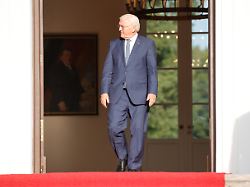Testing procedures at the EU’s external border
Steinmeier: “We need to limit access”
October 3, 2023, 11:29 a.m
In the debate about the influx of refugees, Federal President Steinmeier is calling for political action. He hopes that this will work better again after the state elections. At the same time, he warned against expecting too much. “It’s a difficult business.”
Federal President Frank-Walter Steinmeier has spoken out in favor of limiting the number of refugees accepted into Germany. “We have to curb so-called illegal migration,” he said on ARD’s “Tagesthemen”. And further: “We need to limit access, there’s no question about that.” But in the end, this limit can only be achieved if Germany carries out external border controls with the other European member states. In addition, it must be ensured that the examination procedures of those who have little or no chance of asylum are carried out at the external borders and the people are then deported from there.
“If we can get this regulation right, and thank God we are on the way now, then the number of arrivals in Germany will also decrease,” said Steinmeier. “It’s a difficult business.” In the debate, one should avoid using formulations that suggest that there is one lever.
“People expect politicians to act”
With regard to migration, Steinmeier said that the overload in numerous municipalities when dealing with asylum seekers reminded him of the period between 1992 and 1993. At that time there were “signals of overload” from mayors and mayors, which led to “politics taking action.” . People also have this expectation right now.
In 1993, in view of the immigration of hundreds of thousands of asylum seekers to Germany every year, the then federal government made up of the CDU/CSU parties and the FDP as well as the opposition SPD agreed on the so-called asylum compromise. As a result, the fundamental right to asylum was significantly restricted.
He also advocates that the federal, state and local governments act together. Politics is currently still in election campaign mode because of the state elections in Hesse and Bavaria. “I very much hope that when this is behind us, a climate will emerge again in which the democratic parties can come to an agreement with each other.” If that is not the case and it remains an eternal topic of debate, others will benefit from it.
“The urban-rural divide is becoming a more pressing problem”
Regarding the current status of German unity 33 years after reunification, he said that the living conditions between West and East had converged in terms of infrastructure and pension values. However, it’s not just about material issues, but “about the feeling of being equal.” Many East Germans “have the feeling that they are not heard and not seen,” said Steinmeier. East German stories must “become more part of our common history.”
In Germany, the difference between town and country is becoming a more pressing problem – both in the west and in the east. Steinmeier said that this was about “the fact that clubs are dying, that the place is no longer so lively, that the last bar is gone, that the distances to schools and doctors have become much longer.” Since significantly more people live in rural areas in the East than in the West, politicians have to take a closer look here.
Steinmeier replied to a question about the high poll numbers for the AfD that he understood that in a democracy people express their dissatisfaction. “I have (…) no understanding of using one’s democratic voice to support ideas or movements that are based on contempt for democracy. And that is why I strongly advocate using one’s own voice responsibly. “
